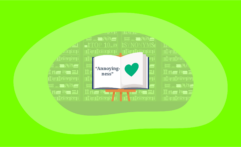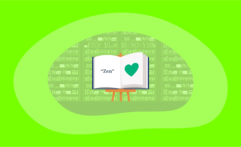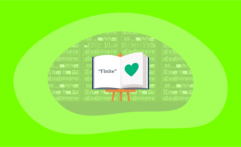Top 10 Positive & Impactful Synonyms for “Chatty” (With Meanings & Examples)
Affiliate Disclosure
Hey fellow impactful ninja ?
You may have noticed that Impactful Ninja is all about providing helpful information to make a positive impact on the world and society. And that we love to link back to where we found all the information for each of our posts.
Most of these links are informational-based for you to check out their primary sources with one click.
But some of these links are so-called "affiliate links" to products that we recommend.
Why do we add these product links?
First and foremost, because we believe that they add value to you. For example, when we wrote a post about the environmental impact of long showers, we came across an EPA recommendation to use WaterSense showerheads. So we linked to where you can find them. Or, for many of our posts, we also link to our favorite books on that topic so that you can get a much more holistic overview than one single blog post could provide.
And when there is an affiliate program for these products, we sign up for it. For example, as Amazon Associates, we earn from qualifying purchases.
What do these affiliate links mean for you?
First, and most importantly, we still only recommend products that we believe add value for you.
When you buy something through one of our affiliate links, we may earn a small commission - but at no additional costs to you.
And when you buy something through a link that is not an affiliate link, we won’t receive any commission but we’ll still be happy to have helped you.
What do these affiliate links mean for us?
When we find products that we believe add value to you and the seller has an affiliate program, we sign up for it.
When you buy something through one of our affiliate links, we may earn a small commission (at no extra costs to you).
And at this point in time, all money is reinvested in sharing the most helpful content with you. This includes all operating costs for running this site and the content creation itself.
What does this mean for me personally?
You may have noticed by the way Impactful Ninja is operated that money is not the driving factor behind it. It is a passion project of mine and I love to share helpful information with you to make a positive impact on the world and society. However, it's a project in that I invest a lot of time and also quite some money.
Eventually, my dream is to one day turn this passion project into my full-time job and provide even more helpful information. But that's still a long time to go.
Stay impactful,
Conversational, sociable, and articulate—positive and impactful synonyms for “chatty” enhance your vocabulary and help you foster a mindset geared toward making a positive impact. So, we had to ask: What are the top ten positive & impactful synonyms for “chatty”?
The top 10 positive & impactful synonyms for “chatty” are conversational, talkative, sociable, gregarious, effusive, expansive, articulate, engaging, witty, and animated. Using these synonyms helps you enhance both your communication and psychological resilience in several meaningful ways.
In the table below, you can see all these top ten synonyms including their descriptions, why they are positive and impactful synonyms for “chatty,” and example sentences that highlight how you can use each of these. We’ll then also share ten benefits of why you should use these synonyms, ten interesting facts about the word “chatty,” and a brief history of the development of our alphabet.
Here Are the Top 10 Positive & Impactful Synonyms for “Chatty”
Our list of positive & impactful synonyms for “chatty” help you expand your vocabulary and enhance both your communication and psychological resilience in several meaningful ways (you can read more about it in the next section).
That’s why it’s so important to focus on synonyms that can be used in a positive and impactful way.
Chatty: readily engaging in informal talk | (of a conversation, letter, etc.) informal and lively
Oxford Dictionary
Our top ten synonyms for “chatty” exemplify the beauty of our language—their meaning is not just fixed but can be shaped by the context they are used in.
| Synonym | Description | Example Sentence |
| Conversational | Involves engaging in or suited to casual talk, highlighting ease in social interactions. It’s a synonym for ‘chatty’ because it emphasizes the ease and flow of dialogue. | “He was conversational at the party, making everyone feel at ease.” |
| Talkative | Describes someone who enjoys talking a lot, focusing on the abundance of speech. It aligns with ‘chatty’ by emphasizing a lively engagement in conversations. | “The talkative child was always full of questions and stories.” |
| Sociable | Implies being inclined to socialize and interact with others, highlighting social connectivity. It’s akin to ‘chatty’ by suggesting an openness and friendliness in communication. | “Her sociable nature made her the perfect host for the event.” |
| Gregarious | Suggests enjoying the company of others, often involving cheerful conversation. It’s a synonym for ‘chatty’ in the context of being socially engaging. | “His gregarious personality lit up the room, drawing people into conversation.” |
| Effusive | Refers to expressing feelings of gratitude or pleasure in an unrestrained way, often through words. It aligns with ‘chatty’ by indicating a warmth and generosity in communication. | “She was effusive in her welcome, chatting warmly with every guest.” |
| Expansive | Describes someone who talks in a detailed and open manner, often sharing freely. It’s akin to ‘chatty’ by suggesting a breadth and openness in conversation. | “He became more expansive after a few minutes, sharing stories from his travels.” |
| Articulate | Implies expressing oneself fluently and coherently, highlighting clarity in communication. It’s a synonym for ‘chatty’ in emphasizing clear and effective conversation. | “She was articulate, making complex topics accessible through casual chat.” |
| Engaging | Suggests captivating attention through interesting and lively interaction. It aligns with ‘chatty’ by indicating an ability to hold interest through conversation. | “His engaging manner made even the simplest conversations fascinating.” |
| Witty | Refers to having a quick and inventive verbal humor, often within lively discussions. It’s akin to ‘chatty’ by suggesting a playful and intelligent exchange of words. | “Her witty repartee kept the dinner conversation lively and entertaining.” |
| Animated | Describes being full of life or excitement, often reflected in spirited conversation. It’s a synonym for ‘chatty’ in the context of vibrant and dynamic exchanges. | “The animated discussion on the book made everyone eager to contribute.” |
10 Benefits of Using More Positive & Impactful Synonyms
Our positive & impactful synonyms for “chatty” help you expand your vocabulary and enhance both your communication and psychological resilience in several meaningful ways:
- Encouraging Positive Framing: Using positive synonyms allows for a more optimistic and affirmative way of expressing thoughts. This can influence not only the speaker’s or writer’s mindset but also positively impact the audience’s perception and reaction.
- Improving Emotional Intelligence: Learning different positive synonyms helps in accurately expressing emotions. This aids in emotional intelligence, as one can more precisely convey feelings and understand the emotions of others.
- Enhancing Persuasive Communication: In persuasive writing and speaking, using positive synonyms can be more effective in convincing an audience, as people generally respond better to positive language.
- Broadening Emotional Vocabulary: A range of positive synonyms enriches your emotional vocabulary. It’s one thing to say you’re “happy” and another to express that you’re “elated,” “joyful,” or “content.” Each word carries a unique emotional hue.
- Creating a Positive Atmosphere: The use of positive language can create a more constructive and encouraging atmosphere in both personal and professional settings. This can lead to better teamwork, more effective communication, and improved interpersonal relationships.
- Enhancing Creative Writing: For those engaged in creative writing, a repertoire of positive synonyms can help in vividly depicting scenes, characters, and emotions, making the narrative more engaging and lively.
- Improving Mental Health and Well-being: Regularly using and thinking in terms of positive words can influence one’s mental state and outlook on life. Positive language has been linked to greater well-being and a more optimistic outlook.
- Improving Cognitive Flexibility: Expanding your vocabulary with positive synonyms enhances your cognitive flexibility. This means you become more adept at thinking creatively and adapting your language use to different situations. The mental exercise involved in learning and using a variety of positive words can also contribute to overall cognitive health, keeping your mind sharp and responsive.
- Building Social Skills and Empathy: When you have a variety of positive words at your disposal, you’re better equipped to offer compliments, encouragement, and empathetic responses in social interactions.
- Facilitating Conflict Resolution: In situations of conflict, the use of positive language can help de-escalate tension. Having a range of positive synonyms allows for more constructive and diplomatic communication.
Overall, your use of positive synonyms not only broadens your vocabulary but also positively influences your thought processes, emotional expression, and interpersonal interactions.
10 Interesting Facts About the Word “Chatty”
Let’s take a step back and have a look at some interesting facts about the word “chatty”.
- Etymology: “Chatty” is derived from “chat,” which came into English in the late 15th century, meaning to talk in a friendly, informal way. The suffix “-y” indicates having a particular quality, hence “chatty” suggests being inclined to chat.
- Evolution of Usage: Initially, “chat” meant to chatter or babble, a connotation that has softened over time to imply friendly, easy conversation, with “chatty” embodying this positive, sociable quality.
- Literary Usage: In literature, chatty characters are often used to add dynamism to dialogue, revealing personality traits and building relationships through their conversational style.
- Psychological Insights: Psychological studies suggest that chatty individuals may excel in social connectivity and emotional intelligence, using conversation to navigate and understand social dynamics effectively.
- Cultural Variations: Attitudes towards chattiness vary culturally, with some societies valuing reserved behavior and others celebrating openness and expressiveness in conversation.
- Impact on Social Bonding: Conversational chattiness is recognized as a tool for social bonding, enabling individuals to share experiences, feelings, and information, thereby fostering stronger communal ties.
- Technological Influence: The digital age has transformed chattiness, with online platforms encouraging more frequent, casual conversation through text, impacting how chattiness is expressed and perceived.
- Language Development: For children, being chatty is often a sign of language and social development, as engaging in varied conversations enhances vocabulary and communication skills.
- Workplace Dynamics: In professional settings, a chatty demeanor can contribute positively to team morale and collaboration, though finding the right balance is key to ensuring productivity.
- Nonverbal Chattiness: The concept of chattiness extends beyond verbal communication to include nonverbal cues and behaviors that indicate a willingness to engage socially, demonstrating the multifaceted nature of human interaction.
A Brief History of Our Alphabet
The story of our alphabet has a rich and compelling history, beginning with ancient civilizations and carrying forward into the present day.
The history of our modern alphabet is a fascinating journey that spans several millennia and cultures. It’s commonly referred to as the Latin or Roman alphabet, and here’s a brief overview of its evolution:
- Phoenician Alphabet (circa 1050 BCE): The story begins with the Phoenician alphabet, one of the oldest writing systems known to use a one-to-one correspondence between sounds and symbols. This Semitic alphabet had about 22 consonants, but no vowels, and was primarily used for trade.
- Greek Alphabet (circa 800 BCE): The Greeks borrowed and adapted the Phoenician script. Crucially, they introduced vowels, making it one of the first true alphabets where each symbol represented a distinct sound (both vowel and consonant). The Greek alphabet had a significant influence on the development of other alphabets.
- Etruscan Alphabet (circa 700 BCE): The Etruscan civilization in Italy adapted the Greek alphabet to their own language. While Etruscan was largely replaced by Latin, their version of the alphabet was a key predecessor to the Roman one.
- Latin Alphabet (circa 700 BCE – Present): The Latin alphabet emerged from the adaptation of the Etruscan script. Ancient Rome used this alphabet, and it spread across Europe as the Roman Empire expanded. The original Latin alphabet did not contain the letters J, U, and W. These were added much later along with other modifications to suit different languages and phonetic needs.
- Modern Variations: Today, the Latin alphabet is the most widely used alphabetic writing system in the world. It has undergone various changes to accommodate different languages and sounds. For instance, English—among other languages—added letters like ‘J’, ‘U’, and ‘W’, while other languages incorporate additional characters like ‘Ñ’ in Spanish or ‘Ç’ in French.
This evolution reflects not just linguistic changes but also cultural and historical shifts, as the alphabet was adapted by different societies across centuries.
Final Thoughts
Expanding your vocabulary is akin to broadening your intellectual horizons and enhancing your capacity to express your thoughts and emotions with precision. By embracing additional synonyms for “chatty,” you’re not just learning new terms, but you’re also gaining nuanced ways to communicate positivity and impact.
The more words you have at your disposal, the more accurately and vividly you can paint your thoughts into speech and writing. So, by growing your vocabulary, especially with positive and impactful words, you’re empowering yourself to engage more effectively and inspiringly with the world around you.
Stay impactful,

Sources
- Society for Personality and Social Psychology: Why a Simple Act of Kindness Is Not as Simple as It Seems: Underestimating the Positive Impact of Our Compliments on Others
- Journal of Personality: Psychological Resilience and Positive Emotional Granularity: Examining the Benefits of Positive Emotions on Coping and Health
- David Sacks: Letter Perfect: The Marvelous History of Our Alphabet From A to Z
- Impactful Ninja: Positive & Impactful Words Starting With A
- Impactful Ninja: Positive & Impactful Words Starting With B
- Impactful Ninja: Positive & Impactful Words Starting With C
- Impactful Ninja: Positive & Impactful Words Starting With D
- Impactful Ninja: Positive & Impactful Words Starting With E
- Impactful Ninja: Positive & Impactful Words Starting With F
- Impactful Ninja: Positive & Impactful Words Starting With G
- Impactful Ninja: Positive & Impactful Words Starting With H
- Impactful Ninja: Positive & Impactful Words Starting With I
- Impactful Ninja: Positive & Impactful Words Starting With J
- Impactful Ninja: Positive & Impactful Words Starting With K
- Impactful Ninja: Positive & Impactful Words Starting With L
- Impactful Ninja: Positive & Impactful Words Starting With M
- Impactful Ninja: Positive & Impactful Words Starting With N
- Impactful Ninja: Positive & Impactful Words Starting With O
- Impactful Ninja: Positive & Impactful Words Starting With P
- Impactful Ninja: Positive & Impactful Words Starting With Q
- Impactful Ninja: Positive & Impactful Words Starting With R
- Impactful Ninja: Positive & Impactful Words Starting With S
- Impactful Ninja: Positive & Impactful Words Starting With T
- Impactful Ninja: Positive & Impactful Words Starting With U
- Impactful Ninja: Positive & Impactful Words Starting With V
- Impactful Ninja: Positive & Impactful Words Starting With W
- Impactful Ninja: Positive & Impactful Words Starting With X
- Impactful Ninja: Positive & Impactful Words Starting With Y
- Impactful Ninja: Positive & Impactful Words Starting With Z




